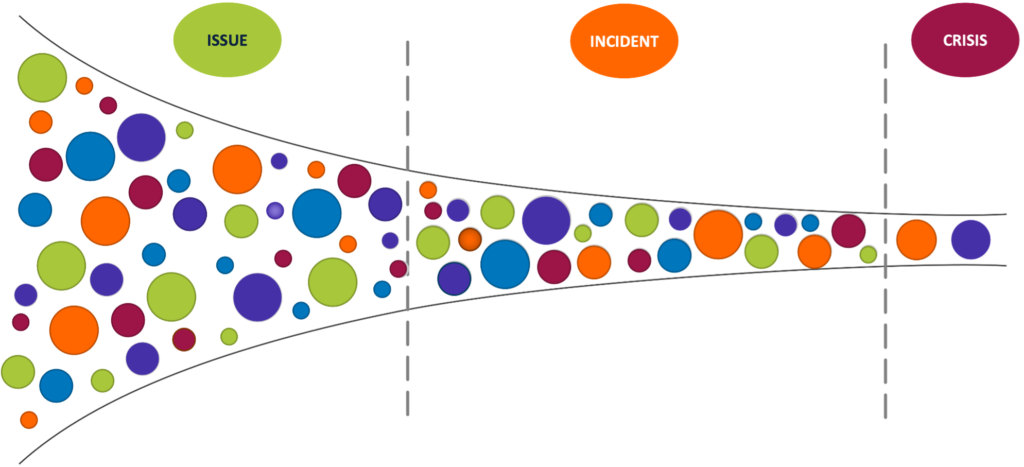Every major issue or crisis an institution faces not only poses a significant reputational risk but also consumes time and resources that would be better spent on other activities. Given that, we strongly believe that a disciplined and rigorous approach to issues management should be at the heart of any program designed to understand, build, and protect an institution’s reputation.
Issues management is essentially about “risk sensing,” one of the four critical components of an institution’s crisis readiness program (see BMCG’s Maturity Model). Risk sensing is the capability to detect and identify issues or events sufficiently early so that the organization can prevent them from degenerating into a crisis. It is a critical, proactive approach to buy an organization the time to map a different strategy to reduce the impact of slow-moving, corrosive issues on the reputation of the institution.
The Challenge and the Promise of an Issues Management Program
Whereas crisis management is about managing high-impact events to protect the ongoing viability and reputation of the institution when you have very few choices and tools, issues management is about pushing back the timeline—creating options, buying time, and ultimately (and ideally) preventing the avoidable, self-inflicted crises from occurring in the first place.

The essential challenge—and, ultimately, the promise—of an Issues Management Program is to nip the smaller and more manageable issues in the bud before they can blossom into a full-blown crisis. Essentially it is about breaking a vicious cycle—installing smoke detectors so you can stop fighting fires.
Onsite Workshop: Facilitated Issue Management Planning Session (3-Hours)
To help the team take the steps necessary to develop this type of program, we propose kicking off with a workshop facilitated by the BMCG team. This session— designed for a leadership team (the EPG or the President’s Cabinet)—takes a proactive view reputational risk management with a specific focus on issues management. In this session, we will:
- Explore the following questions:
- What is the difference between an issue and a crisis?
- Does it matter?
- How do you stop fighting fires and finally get ahead of your issues?
- Provide concrete tools to help the institution begin to develop a program, using our:
- Issue Identification & Prioritization Tool which helps provide the much-needed rigor and discipline to the process of understanding both strategic opportunities as well as slower-moving risks the institution faces.
- “CASE” Option’s Analysis Framework to help the team assess the risk or opportunity each issue presents and to match that to tangible strategic action.
- Help the team develop a draft project plan for one specific issue as a way to demonstrate how the issues management approach can be more broadly incorporated into how the institution identifies, manages and responds to issues of concern by:
-
-
- Defining goals/objectives.
- Identifying any “low-hanging fruit” that could quickly make a significant impact/difference.
- Determining appropriate metrics to measure progress.
- Incorporating reporting / escalation criteria into any existing processes to ensure early warning of related and concerning developments.
- Documenting approval process, costs, and timelines for implementation, as necessary.
- Developing a Stakeholder Engagement Strategy.
-
Pre-Workshop: Issues Identification and Initial Prioritization
Note: Using an online survey tool, we ask your team to evaluate and prioritize a range of risks and issues on a scale of 1 to 5. This information is aggregated and becomes an important input into the facilitated planning session.
Reputational Risk Management Framework
Built on a solid risk management program, effective reputational risk management is a proactive framework and process that identifies strategic opportunities as well as risks, effectively manages crises or significant issues when they do arise, and creates a reservoir of goodwill amongst the multiple stakeholders the organization requires to thrive.
It is comprised of three fundamental capabilities—risk, crisis, and issues management—which not only build on one another but also reflect an increasing level of sophistication, maturity, and capability in an organization’s approach.
Designed to help an institution withstand the credibility test of intense external scrutiny while meeting strategic objectives, this model relies on a mind-set that actively incorporates reputational risk as critical input into institutional decision-making
Deliverables
The development of an Issues Management Program will help the institution both proactively identify issues that can have a significant and, possibly, corrosive impact on the school’s reputation and aggressively manage and/or mitigate those issues—using a stakeholder-centric approach—before they reach a crisis-level.